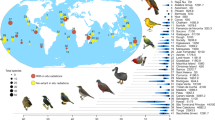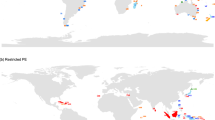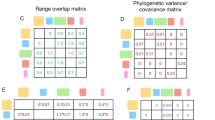Abstract
Arising from: B. C. Emerson & N. Kolm Nature 434, 1015–1017 (2005); B. C. Emerson & N. Kolm reply
Emerson and Kolm1 show that the proportion of species endemic to an island is positively related to its species richness and, assuming that endemism indexes speciation rate, they infer that greater species diversity accelerates diversification. Here we demonstrate that the same correlation between species richness and percentage endemism can arise even if within-island speciation is negligible, particularly when both endemism and species richness depend on attributes of islands (such as area) that influence the average age of resident populations. Island biogeography theory indicates that, where the average time to extinction is relatively long, diversity increases through colonization, irrespective of whether new species are formed2; at the same time, islands on which populations persist for longer accumulate more endemic species as local populations differentiate and populations on neighbouring islands become extinct3,4. We therefore suggest that species richness and endemism are correlated fortuitously owing to their mutual dependence on the life spans of populations on islands, which is unrelated to speciation itself.
This is a preview of subscription content, access via your institution
Access options
Subscribe to this journal
Receive 51 print issues and online access
$199.00 per year
only $3.90 per issue
Buy this article
- Purchase on Springer Link
- Instant access to full article PDF
Prices may be subject to local taxes which are calculated during checkout

Similar content being viewed by others
References
Emerson, B. C. & Kolm, N. Nature 434, 1015–1017 (2005).
MacArthur, R. H. & Wilson, E. O. The Theory of Island Biogeography (Princeton Univ. Press, Princeton, New Jersey, 1967).
Mayr, E. Science 150, 1587–1588 (1965).
Losos, J. B. & Schluter, D. Nature 408, 847–850 (2000).
Ricklefs, R. E. & Bermingham, E. Am. Nat. 163, 227–239 (2004).
Johnson, K. P., Adler, F. R. & Cherry, J. L. Evolution 54, 387–396 (2000).
Goldberg, E. E., Roy, K., Lande, R. & Jablonski, D. Am. Nat. 165, 623–633 (2005).
Baldwin, B. G. & Sanderson, M. J. Proc. Natl Acad. Sci. USA 95, 9402–9406 (1998).
Emerson, B. C. & Oromí, P. Evolution 59, 586–598 (2005).
Nee, S., Mooers, A. Ø. & Harvey, P. H. Proc. Natl Acad. Sci. USA 89, 8322–8326 (1992).
Pybus, O. G. & Harvey, P. H. Proc. R. Soc. Lond. B 267, 2267–2272 (2000).
Author information
Authors and Affiliations
Corresponding author
Rights and permissions
About this article
Cite this article
Cadena, C., Ricklefs, R., Jiménez, I. et al. Is speciation driven by species diversity?. Nature 438, E1–E2 (2005). https://doi.org/10.1038/nature04308
Published:
Issue Date:
DOI: https://doi.org/10.1038/nature04308
This article is cited by
-
Goldilocks Meets Santa Rosalia: An Ephemeral Speciation Model Explains Patterns of Diversification Across Time Scales
Evolutionary Biology (2012)
-
Adaptive Radiations in the Context of Macroevolutionary Theory: A Paleontological Perspective
Evolutionary Biology (2012)
Comments
By submitting a comment you agree to abide by our Terms and Community Guidelines. If you find something abusive or that does not comply with our terms or guidelines please flag it as inappropriate.



